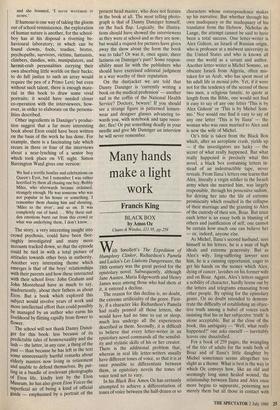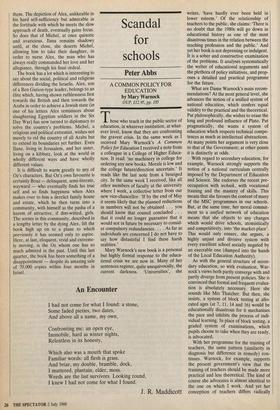Many hands make a light work
Francis King
BLACK BOX by Amos Oz
Chatto & Windus, £11.95, pp.259 ith Smollett's The Expedition of Humphrey Clinker, Richardson's Pamela and Laclos's Les Liaisons Dangereuses, the 18th century was the great period for the epistolary novel. Subsequently, although Jane Austen, Maria Edgeworth and Henry James were among those who had shots at it, it entered a decline. The reason for this decline is, no doubt, the extreme artificiality of the genre. First- ly, if a character like Richardson's Pamela had really penned all those letters, she would have had no time to eat or sleep, much less undergo all the experiences described in them. Secondly, it is difficult to believe that every letter-writer in an epistolary novel commands all the sensibil- ity and stylistic skills of his or her creator. There is the additional problem that, whereas in real life letter-writers usually have different tones of voice, so that it is at once possible to differentiate between them, in epistolary novels the tones of voice tend not to vary.
In his Black Box Amos Oz has certainly attempted to achieve a differentiation of tones of voice between the half-dozen or so characters whose correspondence makes up his narrative. But whether through his own inadequacy or the inadequacy of his translator from the Hebrew, Nicholas de Lange, the attempt cannot be said to have been a total success. One letter-writer is Alex Gideon, an Israeli of Russian origin, who is professor at a midwest university in the United States and who is known all over the world as a savant and author. Another letter-writer is Michel Sommo, an obscure Israeli from Algeria, often mis- taken for an Arab, who has spent most of his adult life in menial jobs. Yet, if it were not for the tendency of the second of these two men, a religious fanatic, to quote at length from the Bible, one would not find it easy to say of any one letter 'This is by Alex Gideon' or `This is by Michel Som- mo.' Nor would one find it easy to say of any one letter 'This is by liana' — the woman who was once married to Alex and is now the wife of Michel.
Oz's title is taken from the Black Box which, after an aeroplane crash, yields up — if the investigators are lucky — the secret of what really happened. But what really happened is precisely what this novel, a black box containing letters in- stead of an indestructible tape, never reveals. From Ilana's letters one learns that Alex, literally a virgin soldier in the Israeli army when she married him, was largely responsible, through his possessive sadism, for driving her into the life of extreme promiscuity Which resulted in the collapse of their marriage and the granting to Alex of the custody of their son, Boaz. But since each letter is an essay both in blaming of others and justification of self, one cannot be certain how much one can believe her — or, indeed, anyone else.
As Michel, liana's second husband, sees himself in his letters, he is a man of high ideals and extreme generosity. But as Alex's wily, long-suffering lawyer sees him, he is a cunning opportunist, eager to get his hands on the money which Alex, dying of cancer, lavishes on his former wife and on Boaz. Again, Alex's letters suggest a nobility of character, hardly borne out by the letters and telegrams emanating from other people. By opting for the epistolary genre, Oz no doubt intended to demons- trate the difficulty of establishing an objec- tive truth among a babel of voices each insisting that his or her subjective 'truth' is alone acceptable. But at the close of the book, this ambiguity — 'Well, what really happened?' one asks oneself — inevitably leaves one dissatisfied.
For a book of 259 pages, the wrangling of the trio of adults for the souls both of Boaz and of Dana's little daughter by Michel sometimes seems altogether too slight as a theme. What is best is the way in which Oz conveys how, like an old and seemingly long since healed wound, the relationship between Ilana and Alex once more begins to suppurate, poisoning not merely them but all those in contact with them. The depiction of Alex, unlikeable in his hard self-sufficiency but admirable in the fortitude with which he meets the slow approach of death, eventually gains focus. So does that of Michel, at once quixotic and avaricious. Ilana remains shadowy until, at the close, she deserts Michel, allowing him to take their daughter, in order to nurse Alex, the man who has always really commanded her love and her allegiance, through his final ordeal.
The book has a lot which is interesting to say about the social, political and religious differences dividing the Israelis. Alex, son of a Ben Gurion-type leader, belongs to an elite which, having shown ruthlessness first towards the British and then towards the Arabs in order to achieve a Jewish state (in one of his letters Alex reminisces about slaughtering Egyptian soldiers in the Six Day War) has now turned to diplomacy to solve the country's problems. Michel, a religious and political extremist, wishes not merely to rid the country of all Arabs but to extend its boundaries yet further. Even Dana, living in Jerusalem, and her sister, living on a kibbutz, look at the world in wholly different ways and have wholly different values.
It is difficult to warm greatly to any of Oz's characters. But Oz's own favourite is certainly Boaz — delinquent, semi-literate, wayward — who eventually finds his true self and so finds happiness when Alex makes over to him a derelict family house and estate, which he then turns into a community, with himself as the pasha of a harem of attractive, if dim-witted, girls. The scenes in this community, described in a lengthy letter by the dying Alex, lift the book high up on to a plane to which previously it has seemed only to aspire. Here, at last, eloquent, vivid and extreme- ly moving, is the Oz whom one has so much admired in the past. Until this last quarter, the book has been something of a disappointment — despite its amazing sale of 70,000 copies within four months in Israel.















































 Previous page
Previous page